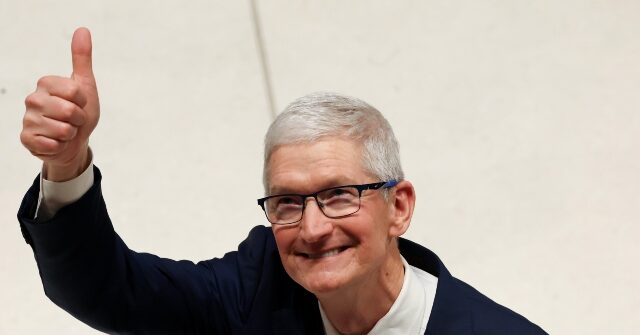As Donald Trump prepares for his return to the presidency, tech industry leaders have begun to engage actively with the incoming administration. Prominent figures have taken the initiative to visit Trump’s Mar-a-Lago resort in Florida, reflecting a desire to establish rapport and possibly influence future policy discussions. A notable attendee in this trend is Apple CEO Tim Cook, who recently dined with Trump, marking a significant face-to-face interaction following a phone conversation they had two months prior. During that phone call, Cook addressed the European Union’s hefty $15 billion fine imposed on Apple, underscoring ongoing regulatory challenges that companies in the tech sector face.
Cook’s visit comes amidst a broader pattern of support from the technology sector for Trump’s inauguration. Several tech executives, including OpenAI’s Sam Altman and Meta’s Mark Zuckerberg, have made substantial financial contributions to Trump’s inaugural fund, demonstrating their willingness to align with the new administration. Altman has committed $1 million out of his pocket, while Amazon, led by Jeff Bezos, has pledged $2 million in total, which includes both cash and in-kind support by streaming the inauguration on Prime Video. Such actions suggest a robust pivot in how the tech industry plans to interact with an administration that has often been characterized by contention in the past.
The growing involvement of these tech leaders with Trump signals a significant shift in strategy as they seek to engage with the presidency proactively. In an era where tech companies often find themselves at odds with government policies on issues such as privacy, data protection, and regulation, this new approach may reflect an understanding of the importance of positioning themselves favorably with the administration. For Cook, the visit signifies more than merely a social engagement; it represents an attempt to foster a working relationship that could potentially benefit Apple in navigating future regulatory landscapes.
Following Trump’s electoral victory over Vice President Kamala Harris, leaders in the tech sector, including Cook, shared their congratulations with the president-elect. Cook’s post on X, a social media platform, signaled his eagerness to collaborate: he expressed hope to work together to ensure that the United States remains a beacon of innovation and creativity. This public messaging indicates that the tech industry is keen on reshaping its narrative with the incoming administration, emphasizing its role as a driver of economic growth and technological advancement.
As the inauguration date approaches, the evolving relationship between the tech industry and the Trump administration will undoubtedly draw scrutiny. Observers will carefully monitor how these interactions influence upcoming policies and regulations that could impact various facets of the tech world, including antitrust regulations, data privacy laws, and the overarching approach to innovation. The willingness of CEO’s to align financially and politically with Trump may pave the way for a more collaborative environment, contrasting sharply with the often adversarial relations seen in previous years.
In summary, the increasing visits of tech leaders, including Tim Cook’s dinner with Trump, signal a new era of engagement between the technology sector and the forthcoming administration. By establishing connections and offering support for Trump’s inauguration, these executives are positioning themselves to influence technology policy while also navigating potential regulatory challenges. The next few months will be crucial in determining how this dynamic unfolds and what it means for the future of technology in the United States. As both sides lay the groundwork for their relationship, it’s clear that the stakes are high for the tech giants aiming to remain at the forefront of innovation while aligning with government initiatives.

